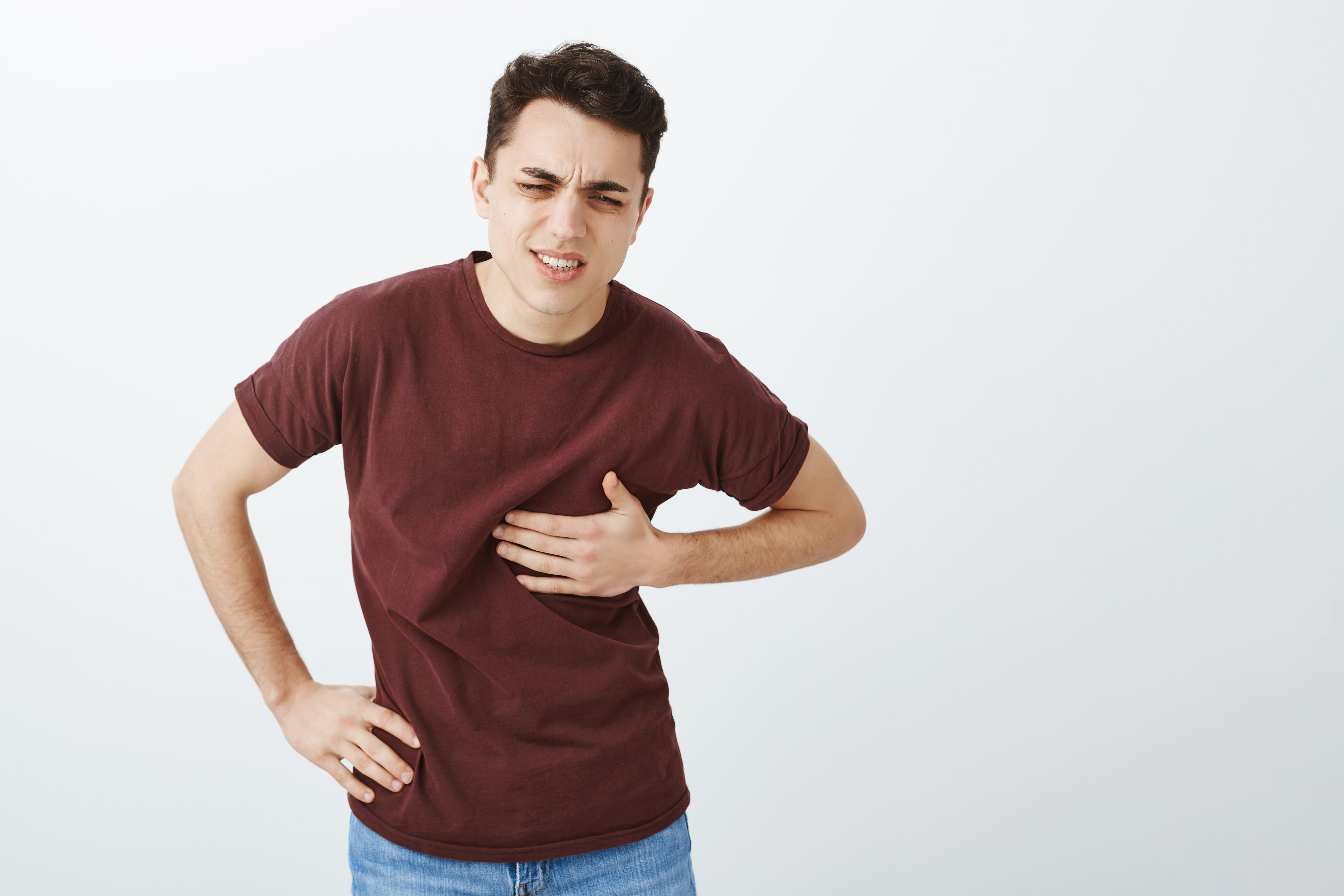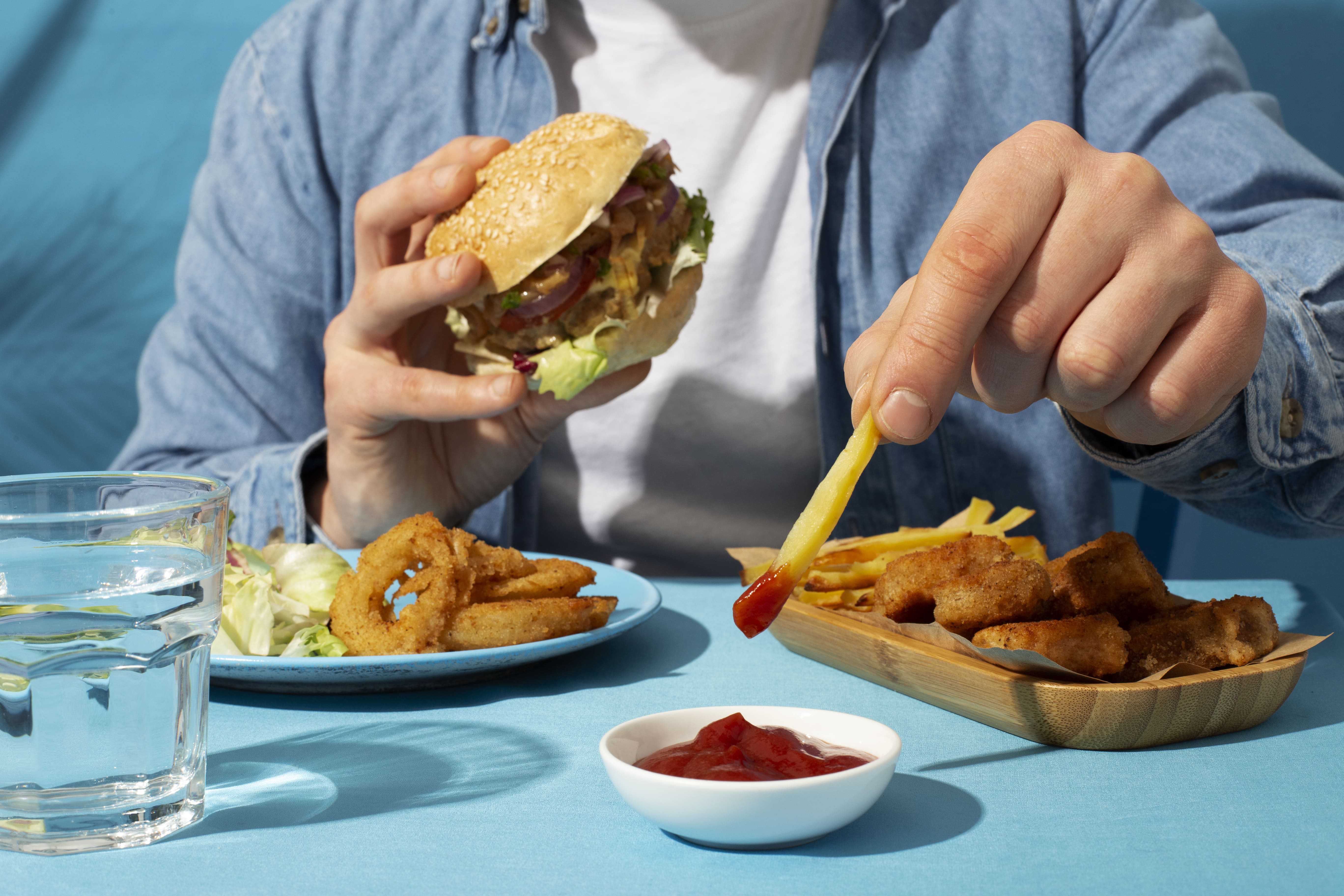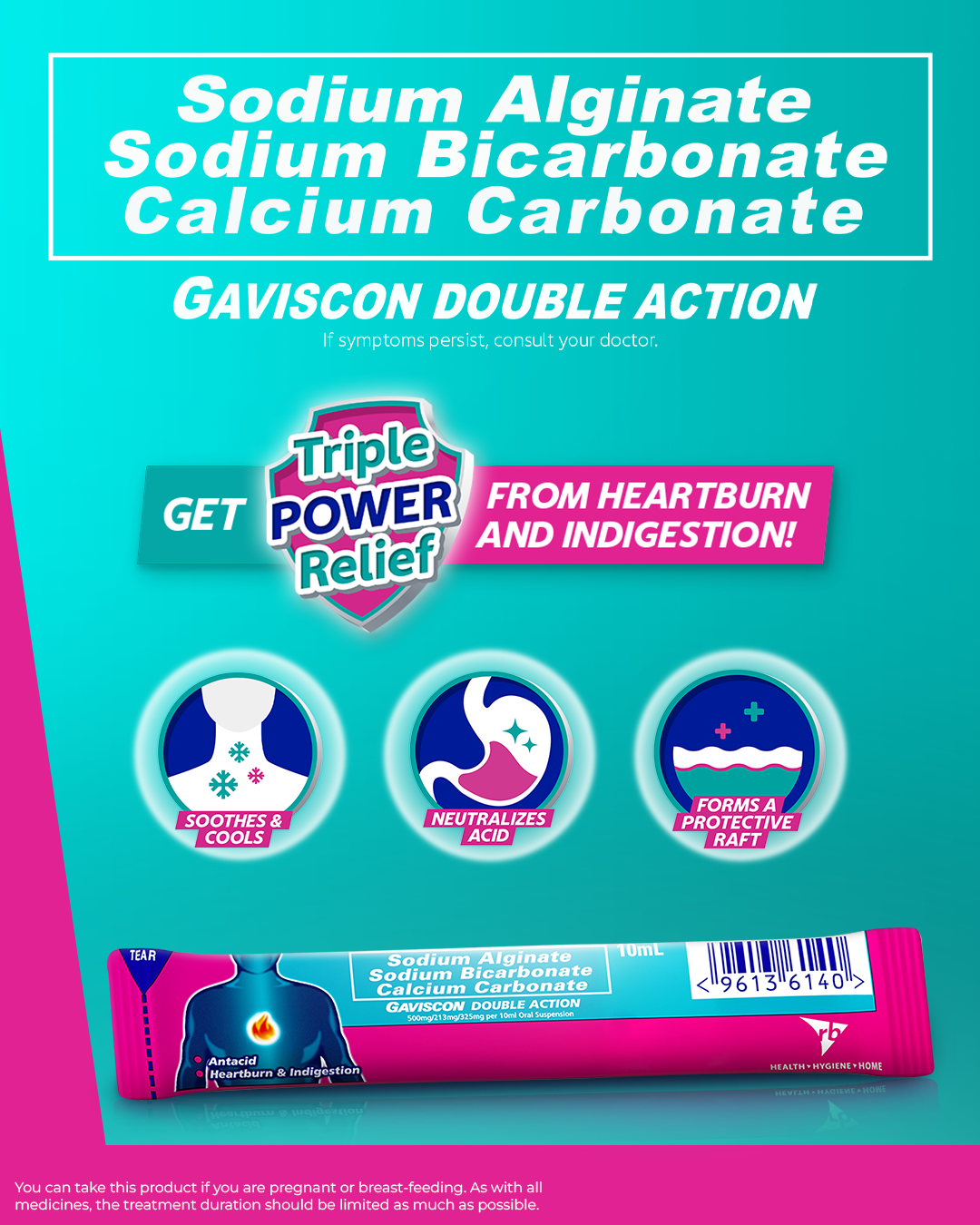The Reality of Heartburn and How to Manage It
Have you ever experienced getting heartburn? Feeling like there is a burning sensation in your chest, as if your heart is literally on fire? Or a tightness in your chest that make you stop and think “Is this it? am I having a heart attack?” This heavy and uncomfortable feeling can become so intense that sometimes you would need to pause your tasks or even end up in the hospital just so you could find relief. Heartburn can sneak up on you at any time, causing you to miss out on life’s important moments.

Image from cookie_studio from Freepik.
Getting to Know Heartburn
Heartburn is that painful, burning feeling in your chest that is caused when stomach acid backs up into your esophagus1, better known as acid reflux. This pain usually occurs in the middle of your chest2, behind the breastbone, and can radiate upwards toward your throat, neck, or jaw. Since the esophagus is closely located to the heart, there are many people that mistake these chest pains to be possible signs of a heart attack and vice versa3.
How do I know that it’s heartburn?
Aside from the burning sensation in chest and /or your throat, signs of heartburn commonly appear as the following symptoms:
- Pressure behind the breastbone
- An acidic, sour, or bitter taste in the mouth
- Having trouble swallowing
- Worsening pain after lying down or bending over
- Feeling bloated
- Needing to burp
Heartburn can also manifest through:
- Coughing or hiccups
- Hoarseness in your voice
- A stuffy nose
- Wheezing
- Waking up from sleep because of cough or stomach discomfort
Usually, these uncomfortable heartburn symptoms are triggered right after eating and can last for a few minutes or even longer, depending on the cause and severity. Moving around after eating or taking antacids can help curb these symptoms quickly but when the chest pain becomes too much for too long, or if you’re unsure of the cause of the pain, it’s best to seek medical help right away.
Experiencing heartburn symptoms once in a while is usually nothing to worry about, but if you consistently experience heartburn, a few times a week or more, you should consult a doctor.
What Causes Heartburn?
Anyone can experience heartburn. Generally, this usually occurs when the contents of your stomach make their way back up your esophagus. The esophagus and the stomach are connected by the lower esophageal sphincter (LES) and when this doesn’t function properly, it can cause acid reflux which can trigger heartburn.
Food and drink are usually seen as the culprits of heartburn though the exact contribution of certain food and drinks to heartburn are still being studied. Research has shown that eating certain food and drink are associated to the relaxing of the lower esophageal sphincter (LES) which can trigger acid reflux symptoms leading to heartburn. Here’s a quick list of food and drinks commonly known to trigger heartburn:
- Fried, high fat, or spicy food
- Mint
- Citrus fruits and juices
- Chocolate
- Onions
- Tomatoes and tomato-based products
- Alcohol
- Coffee and caffeinated drinks
- Sodas and carbonated beverages

Image from Freepik.
Other possible heartburn causes include:
- Being overweight 11 – Carrying extra weight can add pressure to the lower esophageal sphincter (LES), causing stomach acid to travel back to the esophagus which can trigger heartburn.
- Stress and anxiety 12 – When you’re stressed, you become more sensitive to smaller amounts of acid in your esophagus which can trigger symptoms of acid reflux and
- Pregnancy8 can cause heartburn. It usually happens during the second and third trimester caused by the increase in progesterone, the growing baby pushing adding pressure onto your organs, and slower digestion

Image from Freepik.
- Hiatal hernia 5 – happens when the upper part of your stomach penetrates through the diaphragm due to weakness or tearing. This lowers the pressure on the LES and can increase the risk of heartburn.
- Certain medications like aspirin, ibuprofen, sedatives, and even blood pressure medication 13 – Some medicines have been reported to trigger sudden heartburn and reflux symptoms. This is especially common among older adults who take multiple medications regularly. Having said this, do not stop any prescribed medication without your doctor’s advice.
- Smoking 13 – This can reduce pressure on the LES which can trigger heartburn but it also reduces the production of saliva which is rich in bicarbonate which can help buffer and clear acid from the esophagus.
- Change in hormones like progesterone and estrogen
- Stomach ulcers
- Bacterial infections in the stomach14 – Helicobacter pylori or H. pylori, contracted through infected water or unsafely prepared food, is a bacteria that can attack the lining that protects your stomach. This bacteria can cause the stomach to be inflamed and produce more acid which can lead to heartburn. If left untreated this can lead to stomach ulcers or even stomach cancer.
The following actions can also trigger heartburn symptoms:
- Eating a large meal
- Lying down and exercising immediately after eating
- Wearing tight clothes

Whatever the cause of your heartburn, it is best to find a remedy that works for you. Some heartburn symptoms usually go away on their own, or with the help of taking an antacid. If you’re looking for quick heartburn relief, you can take Sodium Alginate + Sodium Bicarbonate + Calcium Carbonate (Gaviscon). You can also try the Tprotective raft. Both variants work in as fast as 3 minutes for heartburn and give relief that lasts up to 4 hours15. They are meant for consumption of adults and children 12 years old and above. Sodium Alginate + Sodium Bicarbonate + Calcium Carbonate (Gaviscon and Gaviscon Double Action) come in liquid or tablet form.
Tips to Relieve Heartburn
- Eat smaller, more frequent meals, as well as, eating in a slow and relaxed manner 6,9 puts less pressure on your lower esophageal sphincter (LES) lowering the chances of heartburn caused by acid reflux
- Chew sugarless gum after your meal 9. Acid can be neutralized through the saliva produced by gum chewing. Though avoid minty flavors because they can trigger heartburn
- Relax! 6,12 Try to lessen stress by doing what works for you. You can try meditation, deep breathing, listening to relaxing music, taking a light walk, etc.
- Try to quit or lessen smoking 5,6,10, if you do.
- Check your meds! 9 Consult your doctor or a pharmacist if any of the meds you take can worsen your acid reflux which can lead to heartburn.
- Try to lose weight 6,9,10 if you need it. Being overweight can add more pressure on your lower esophageal sphincter (LES), increasing the risk of heartburn.
- If you do experience waking up with heartburn, tilt your torso up when you sleep with a wedge-shaped cushion 5,6,9,10 that can help reduce the pressure on your LES.
Here are some things you can avoid to help prevent heartburn:
- Ditch the food and drink that can trigger your heartburn. 5,6,9,10 These can be fried, high fat, or spicy food. Coffee, alcohol, and soda are also common triggers.
- Avoid eating late at night or too close to your bedtime. 6,9,10 Your last meal should be 3 to 4 hours before your bedtime. Give your stomach enough time to digest!
- Don’t lie down after eating. 5,6,9 Lying down aggravates acid reflux and heartburn symptoms.

Image from jcomp from Freepik.
- Abstain from strenuous activities or heavy exercising 9 immediately after meals.
- Avoid wearing tight clothing 5,6,10 especially around your waist.
Following these dos and don’ts will surely help you in dealing with what causes heartburn. Though if heartburn symptoms continue to persist, it’s best to schedule a visit with your doctor to find out the underlying causes of your heartburn and discuss other possible treatment options.
Now that you’ve discovered more about heartburn, along with its causes and symptoms, as well as its treatments and remedies, we hope that you feel better equipped to deal with heartburn symptoms.
If you want to learn more about how Sodium Alginate + Sodium Bicarbonate + Calcium Carbonate (Gaviscon) can help with heartburn, you can click here.
Frequently Asked Questions (FAQs)
REFERENCES
- Heartburn. Available at https://medlineplus.gov/heartburn.html Accessed on 20 September 2024.
-
Symptoms and Causes of GER & GERD. Available at https://www.niddk.nih.gov/health-information/digestive-diseases/acid-reflux-ger-gerd-adults/symptoms-causes Accessed on 20 September 2024.
-
Heartburn or Heart Attack? Available at https://www.heart.org/en/health-topics/heart-attack/angina-chest-pain/heartburn-or-heart-attack Accessed on 20 September 2024.
-
Heartburn: How Long Can It Last and How to Find Relief Available at https://www.healthline.com/health/how-long-does-heartburn-last Accessed on 20 September 2024.
-
What You Need to Know About Heartburn. Available at https://www.healthline.com/health/heartburn Accessed on 20 September 2024.
-
Heartburn and acid reflux. Available at https://www.nhs.uk/conditions/heartburn-and-acid-reflux/ Accessed on 20 September 2024.
-
9 Foods That May Cause Heartburn. Available at https://www.healthline.com/nutrition/foods-that-cause-heartburn Accessed on 20 September 2024.
-
Heartburn in Pregnancy: 11 Treatments to Put Out the Fire Available at https://www.healthline.com/health/pregnancy/heartburn-during-pregnancy Accessed on 20 September 2024.
- 11 stomach-soothing steps for heartburn. Available at https://www.health.harvard.edu/staying-healthy/11-stomach-soothing-steps-for-heartburn. Accessed on 20 September 2024.
-
Heartburn. Available at https://familydoctor.org/condition/heartburn/?adfree=true Accessed on 20 September 2024.
-
GERD and Obesity. Available in https://www.uchicagomedicine.org/conditions-services/esophageal-diseases/gastroesophageal-reflux-disease/gerd-and-obesity#. Accessed on 10 December 2024.
-
Can Stress Cause Acid Reflux? Available at https://www.healthline.com/health/gerd/stress. Accessed on 10 December 2024.
-
Ness-Jensen, E., & Lagergren, J. (2017). Tobacco smoking, alcohol consumption and gastro-oesophageal reflux disease. Best practice & research. Clinical gastroenterology, 31(5), 501–508. Available at https://pubmed.ncbi.nlm.nih.gov/29195669/ Accessed on 10 December 2024.
-
Helicobacter Pylori. Available at https://www.hopkinsmedicine.org/health/conditions-and-diseases/helicobacter-pylori Accessed on 10 December 2024.
-
Strugala V., et al. (2010). A Randomized, controlled, crossover trial to investigate times to onset of the perception of soothing and cooling by over-the-counter heartburn treatments. Journal of International Medical Research. 38(2):449-57. Available at https://doi.org/10.1177/14732300100380020. Accessed on December 9, 2024.
-
Thomas E., et al. (2014). Randomised clinical trial: relief of upper gastrointestinal symptoms by an acid pocket-targeting alginate-antacid (Gaviscon Double Action) - a double-blind, placebo-controlled, pilot study in gastro-esophageal reflux disease. Aliment Pharmacol Ther. 39(6):595-602. Available at https://doi.org/10.1080/03639045.2018.1546314. Accessed on January 11, 2025.
Treatment
To stop acid from rising up and causing irritation, Gaviscon products use sodium alginate, a viscous formulation that forms a protective barrier on top of the stomach contents. Gaviscon Double Action products also contain antacids, which neutralizes acids.
By combining the two actions, you enjoy powerful relief, thereby taking your life off pause.
Dosage: Take 10-20 ml (1-2 sachets) of Gaviscon Original or 10-20ml (1-2 sachets) of Gaviscon Double Action after meals and at bedtime or 2-4 tablets of either Gaviscon Original or Gaviscon Double Action tablet.
For children 6 to 12 years: take 5-10ml (one to two 5 ml spoonfuls) after meals and at bedtime, up to four times a day (Gaviscon Original).
All information presented is not meant to diagnose or prescribe. If symptoms persist, consult your doctor. Always read the label.